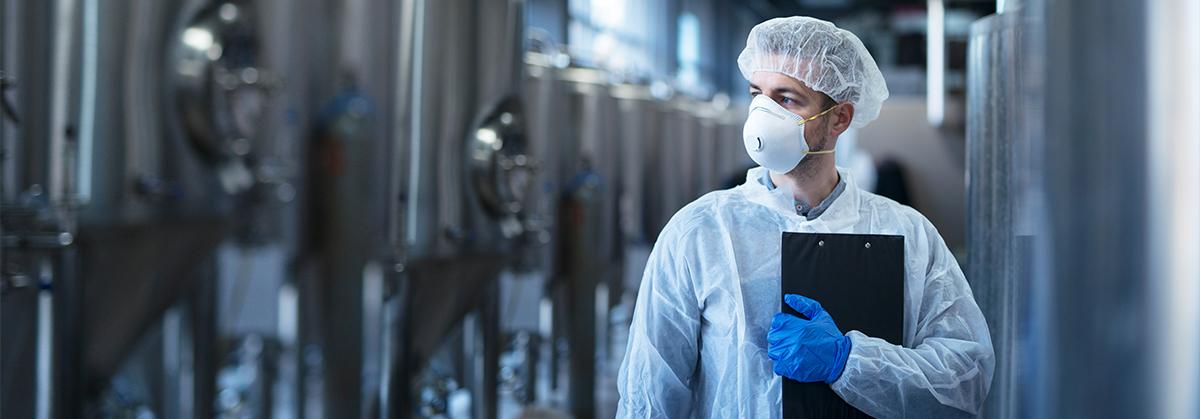Mitigating Coronavirus Risks in Food Processing and Handling Facilities

By Heena Patel, SCS Global Services
With the food industry on the frontlines of the Covid-19 pandemic, mitigating risk of exposure to the coronavirus in the workplace is crucial. Companies involved in every part of the food supply chain – from food production and processing to handling, distribution and retail – are stepping up to do their part.
Here are several steps that food facility managers should consider to help their workers maintain social distance and stay safe. Some of these measures are simple and inexpensive to undertake, while others will require more effort and resources. But they will pay off in the long run, keeping workers healthy, while protecting businesses and the community at large.
- Education
The first step is to ensure that employees are knowledgeable about the factors that can lead to the spread of the coronavirus, and the risks this poses to themselves, their fellow workers, and their loved ones. While your employees are well aware of the pandemic, they may not always well-versed on the best ways to stay safe. Take advantage of all the communications options available in your toolkit, from company newsletters and videos to posted signage around the workplace. Provide mandatory training on appropriate measures to avoid being exposed, including use of personal protective equipment (PPE), hand washing and social distancing, in the languages that your employees will understand best. In addition, provide links to trusted resources, such as the Centers for Disease Control and Prevention and the Occupational Safety and Health Administration’s (OSHA) free "Guidance on Preparing Workplaces for COVID-19."
- Personal Protection
It goes without saying that all workers should be provided with protective equipment (PPE) and clothing appropriate to the work environment, such as facial masks, gloves, hair nets, beard nets, and work smocks. PPE should be provided to the workers free of charge. However, this can be easier said than done, given the increased demand and shortage of supply for some of the items. Moreover, scammers pretending to have large amounts of PPE in storage are taking advantage of the current crisis to swindle companies and health care providers alike. So be sure to vet your supply sources very carefully. Another important step you can take to promote personal protection is to provide more hand washing stations, and place hand sanitizers at every point of entry and around the workplace.
- Taking Active Steps to Space Out Employees
Finding ways to increase the physical distance or provide physical barriers between workers is crucial to stem potential outbreaks that can occur if even one employee is sick but asymptomatic. Measures such as repositioning of work stations and changes to employee flow can help. You can further reinforce social distancing by staggering work shifts to limit the number of employees per shift and spreading out employee breaks so that fewer employees break at the same time. If possible, expand the break room, or provide outdoor break areas, to avoid clustering of employees at any one time and location. Additionally, those employees who can fulfill their job responsibilities from home should be asked to do so until shelter-in-place recommendations are lifted.
- Monitoring and Access Restrictions
Remain vigilant throughout the facility to remind employees of these safety measures. Monitor the production floor for personal hygiene and safe distancing. Additionally, institute monitoring of workers for any signs of fever or illness every day, including taking temperatures before they begin their shifts. Increasing the frequency of facility inspections can help. Many companies have instituted access restrictions to their worksites to limit or prevent outside visitation. If visitors are allowed, they should first be prepared to respond to questions about their recent travel, illnesses, and potential exposure to the coronavirus.
- Cleaning and Sanitation
Employers operating workplaces during the COVID-19 pandemic should continue routine cleaning and other housekeeping practices in any facilities that remain open to workers or others. Routine cleaning and increasing the frequency of cleaning and disinfection procedures will minimize the cross-contamination from potential microbiological sources. Sanitation not only should include company tools and equipment, but personal equipment such as cellphones as well.
- Policies and Incentives
Finally, companies should review their policies regarding paid sick leave and time off. As has been widely reported in the media, many food industry workers are reporting for work despite the fact that they are feeling ill, for fear of losing pay or even their jobs. This is endangering not only the worker, but the entire workplace. Paid sick leave and time off will encourage employees who feel ill to stay away from the workplace and give everyone the breathing room they need. Likewise, media reports have called attention to the fact that many food industry workers are traveling in crowded vehicles to and from work, where one person’s cough may expose the whole carload. Consider incentivizing transportation options to prevent workers from crowding into cars and trucks to commute to work.
As a long-time third-party provider of food safety and security certification, SCS has inspected a wide range of facility operations over the decades, observing what works and what doesn’t in terms of worker hygiene and safety. Now, more than ever, it is time to step up these efforts. We, too, are innovating in the area of auditing protocols to keep our auditors and our clients safe, while ensuring that companies up and down the supply chain can continue to meet the food safety demands of their customers. Pulling together, the food industry as a whole can continue to provide its essential services to the marketplace.
Heena Patel is the Technical Director of Food Safety for SCS Global Services, where she has managed technical food safety audits for two decades. In 2015, Ms. Patel was named SQF Auditor of the Year by the Safe Quality Food Institute. For more information, she can be reached at hpatel@scsglobalservices.com, or 510-821-9818. Or visit https://www.scsglobalservices.com/services/food-safety

